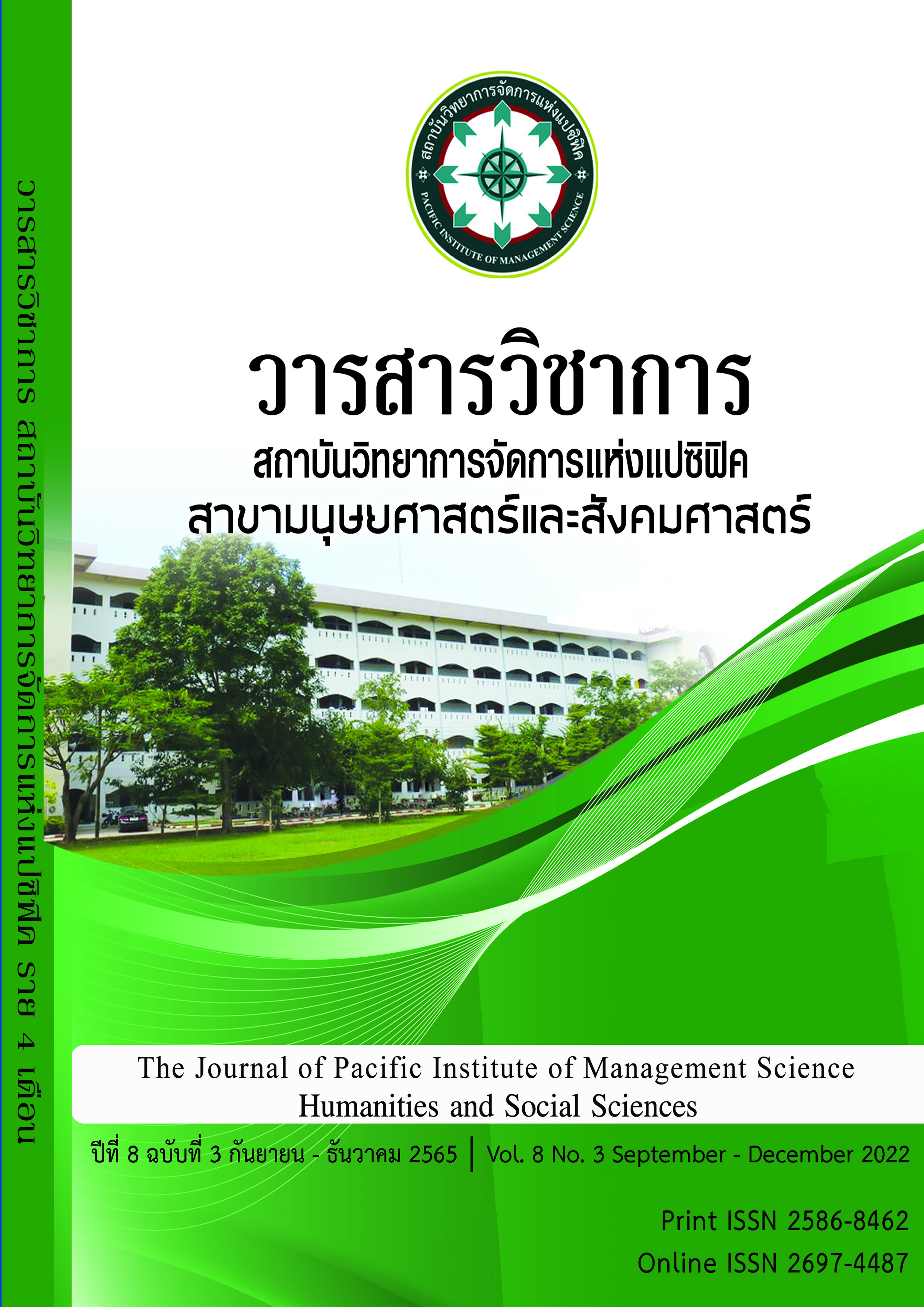The Participation Mechanism in Developing the Schools Educational Quality
Keywords:
Participation, Educational QualityAbstract
Participation is the process by which an entity or organization allows individuals or groups of stakeholders to form groups of people. club or organization to participate To develop the quality of education management. Participate in the promotion, suggestion, maintenance, rehabilitation, improvement and development of learning management quality in educational institutions. including policy planning operation and monitoring the performance of education management
Participation in the development of educational management quality is a process, method, promotion and support. Participation in improving the quality of education management, such as mobilizing resources for education. making public-private partnership agreements; charitable participation; legislation or tax incentives By categorizing the analysis according to the main stakeholders, such as government agencies. External agencies or private organizations Parents and community with the emphasis on family Must be closely involved in the development of the quality of children's education. In particular, the "child" or the learner must be aware and aware of their own responsibility for participating in the development of their own quality of education as a direct beneficiary of their participation. ensemble Developing knowledge and understanding for learners to know They have their own “learning plan” and are responsible for leading and controlling themselves to achieve the plan. by emphasizing learning outside the classroom that integrates resources, natural environment, arts and culture, public places, workplaces village philosophers, important people, etc., under the definition “everyone is a teacher Everywhere is a classroom” for children's development and cultural preservation. Parents and community members increasingly understand the benefits of working together with teachers and schools. so that they feel more responsible and more connected to the community And always allow the community to participate in continuous improvement. This article synthesizes participation in improving the quality of education of schools in the remote areas of the highlands of Thailand. According to the project to study patterns and mechanisms for participation in improving the quality of school education in the remote areas of the highlands of Thailand. Received a budget from the Secretariat of the Education Council
References
กระทรวงศึกษาธิการ. (2545). พระราชบัญญัติการศึกษาแห่งชาติ พุทธศักราช 2542 (ฉบับที่ 2) และที่แก้ไข เพิ่มเติมพุทธศักราช 2545. กรุงเทพฯ: บริษัทสยามสปอรต์ ซินดิเค จำกัด
นุชา สะสม. (2560). การมีส่วนร่วมในการบริหารแบบบ้านวัดและโรงเรียนวัด สังกัด กรุงเทพมหานคร.(วิทยานิพนธ์ปรัชญาดุษฎี). มหาวิทยาลัยศิลปกร. กรุงเทพฯ.
ปารณทัตต์ แสนวิเศษ. (2555). การมีส่วนร่วมของชุมชนในการจัดการศึกษาขั้นพื้นฐานของโรงเรียนประถมศึกษา : การสร้างทฤษฎีฐานรากหลักสูตร. (วิทยานิพนธ์ปรัชญาดุษฎีบัณฑิต). มหาวิทยาลัยราชภัฎสกนนคร.สืบค้นจาก https://gsmis.snru.ac.th/e-thesis/thesis_detail?r=533JPe105
พัฒนะพงษ์ สุขมะดัน และเสาวลักษณ์ กมลนาวิน. (2562). จากนับหนึ่งจนถึงวันนี้ บทสรุปการดำเนินงานและกรณีตัวอย่างการพัฒนาการเรียนรู้เชิงพื้นที่. กรุงเทพมหานคร: กองทุนเพื่อความเสมอภาคทางการศึกษา.
พิณสุดา สิริธรังศรี. (2557). รูปแบบการบริหารจัดการสถานศึกษาขั้นพื้นฐาน. กรุงเทพฯ: พริกหวานกราฟิค.
ศศิวิมล จุลศิลป์. (2553). การพัฒนารูปแบบการมีส่วนร่วมของชุมชนในการนำภูมิปัญญาท้องถิ่นมาใช้จัดการศึกษาตามปรัชญาของเศรษฐกิจพอเพียงในสถานศึกษาขั้นพื้นฐาน:การประยุกต์ใช้กระบวนการเอไอซี. Suranaree Journal of Science and Technology, 4(2).สืบค้นจาก https://www.car.chula.ac.th/display7.php?bib=b1858324
สำนักงานปฏิรูปการศึกษา. (2545). แนวทางการบริหารและการจัดการศึกษาในเขตพื้นที่การศึกษาและสถานศึกษา (พิมพ์ครั้งที่ 2 ) กรุงเทพฯ : สำนักงานปฏิรูปการศึกษา
สำนักงานเลขาธิการสภาการศึกษา. (2562). รายงานการศึกษารูปแบบและกลไกการมีส่วนร่วมและสมัชชา การศึกษา. กรุงเทพมหานคร: พริกหวานกราฟฟิค
อโณทัย ไทยวรรณศรี และคณะ. (2561). รูปแบบการพัฒนาครูผู้สอนของสถานศึกษาขั้นพื้นฐานในเขตพื้นที่สูง สังกัดสำนักงานคณะกรรมการการศึกษาขั้นพื้นฐาน กระทรวงศึกษาธิการ .วารสารศึกษาศาสตร์ มหาวิทยาลัยนเรศวร, 20(1). สืบค้นจาก https://so06.tci-thaijo.org/index.php/edujournal_nu/article/view/115569
เอกพล ดวงศรี. (2563). การมีส่วนร่วมในการจัดการศึกษาของประชาชนตามร่างพระราชบัญญัติการศึกษาแห่งชาติฉบับใหม่. ศึกษาศาสตร์สาร มหาวิทยาลัยเชียงใหม่. 4(3), 1-15.
ทฤทฏีแรงจูงใจของ Maslow. สืบค้นจาก https://sites.google.com/site/bacsang0710/kar-srang-raeng-cungci/thvsdi-khxng-raeng-cungci
JP. Whang. (1981). Participation in Planned Development. New York: Wageninggen.
Yadav. (1980). Local level Planning and Rural Development Alternatives strategy. New Delhi: Concept Publishing Company.
Cox E, & Caldwell P. (2000). "Making policy social," in Social capital and public policy in Australia (I. Winter Ed.). Melbourne: National Library of Australia.
Cohen, J.M., & Uphoff, N.T. (1981). Rural Development Participation: Concept and Measure For Project Design Implementation and Evaluation: Rural Development Committee Center for international Studies. New York: Cornell University Press.
Felkins PK. Linked. (2002). Communities and social capital. In Community at Work:Creating and celebrating community in organizational life. New Jersey: Hampton Press Inc.
United Nation. Department of Internation Economic and Social Affair. (2009). Popular Participation as a Strategy for Promoting Community Level Action and Nation Development. Report of The Meeting for The Adhoc Group of Expert. New York: United Nation.
Downloads
Published
Issue
Section
License
Copyright (c) 2022 Pacific Institute of Management Science

This work is licensed under a Creative Commons Attribution-NonCommercial-NoDerivatives 4.0 International License.
บทความที่ได้รับการตีพิมพ์เป็นลิขสิทธิ์ของ สถาบันวิทยาการจัดการแห่งแปซิฟิค
ข้อความที่ปรากฏในบทความแต่ละเรื่องในวารสารวิชาการเล่มนี้เป็นความคิดเห็นส่วนตัวของผู้เขียนแต่ละท่านไม่เกี่ยวข้องกับสถาบันวิทยาการจัดการแห่งแปซิฟิค และคณาจารย์ท่านอื่นๆในสถาบันฯ แต่อย่างใด ความรับผิดชอบองค์ประกอบทั้งหมดของบทความแต่ละเรื่องเป็นของผู้เขียนแต่ละท่าน หากมีความผิดพลาดใดๆ ผู้เขียนแต่ละท่านจะรับผิดชอบบทความของตนเองแต่ผู้เดียว







